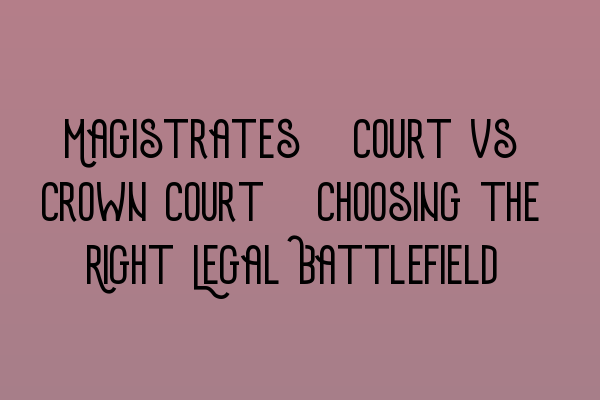Magistrates’ Court vs Crown Court: Choosing the Right Legal Battlefield
Welcome to the SQE Criminal Law & Practice Law UK blog! In this article, we will explore the key differences between Magistrates’ Court and Crown Court, helping you understand the factors to consider when choosing the right legal battlefield.
What is the Magistrates’ Court?
The Magistrates’ Court is the lower court in the criminal justice system, dealing with less serious criminal cases. It consists of a panel of lay magistrates or a District Judge, presiding over the proceedings. The court handles cases such as minor assaults, theft, traffic offenses, and less severe drug offenses.
To gain a deeper understanding of the criminal law and practice, it is essential to familiarize yourself with the SQE 1 preparation courses that cover a wide range of legal topics required for the SQE exams.
What is the Crown Court?
The Crown Court, on the other hand, is a higher court that deals with serious criminal cases. These cases are typically more complex and carry severe penalties. The proceedings in the Crown Court involve a judge, a jury, and legal professionals representing the prosecution and defense. Examples of cases heard in the Crown Court include murder, rape, robbery, and drug trafficking.
If you are preparing for the SQE 2 exams, it is crucial to enroll in quality SQE 2 preparation courses that will equip you with the necessary skills and knowledge to excel in criminal law and practice.
Factors to Consider
When deciding whether a case should be heard in the Magistrates’ Court or the Crown Court, several factors come into play:
- The seriousness of the offense: Generally, less serious offenses are dealt with in the Magistrates’ Court. However, some cases may be initially heard in the Magistrates’ Court but transferred to the Crown Court if they are deemed more serious.
- Choice of trial by the defendant: In some cases, the defendant has the right to choose whether to be tried by the Magistrates’ Court or the Crown Court.
- Complexity of the case: More complex matters, such as those with multiple charges, intricate legal issues, or extensive evidentiary requirements, are usually heard in the Crown Court.
- Sentencing powers: The Magistrates’ Court has limited sentencing powers, typically imposing fines and short custodial sentences. The Crown Court can hand down longer custodial sentences, including life imprisonment.
To maximize your chances of success in the SQE exams, take advantage of our comprehensive SQE 1 practice exam questions and SQE 1 practice mocks FLK1 FLK2 that simulate the exam environment and test your knowledge and understanding of criminal law and practice.
Conclusion
Choosing the right legal battlefield, whether the Magistrates’ Court or the Crown Court, depends on various factors related to the seriousness of the offense, complexity of the case, and the sentencing powers of each court.
At SQE Criminal Law & Practice Law UK, we offer comprehensive preparation courses for both the SQE 1 and SQE 2 exams, ensuring you have the knowledge, skills, and practice necessary to excel in criminal law and practice.
For further information and updates on the upcoming SRA SQE exam dates, please visit our website.
